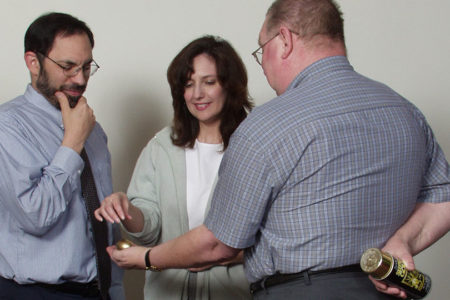Is the New Testament Anti-Semitic?
If I had been asked, “Is the New Testament anti-Semitic?” during my university years, I would not have hesitated a moment before answering, “Yes!”
My formative years were spent surrounded by people whose perception of “that book” was of its inherent evil and dangerous intent. As far as I was concerned, my people experienced years of bitter suffering as a direct result of the contents of that Gentile Bible. Interestingly, I had never read it. In fact, I could not imagine even touching its pages. Yet I was sure that humiliating and hateful terms, such as “Christ killers” and “children of the Devil,” were quoted from it. Today many people have this perception of the New Testament, and by no means are all of them Jewish.
What many believe the New Testament teaches is summarized as follows:
God chose the Jewish people, but they were disobedient; and when God sent them prophets, Israel rejected and killed them. These prophets promised a Redeemer would come who would be God in the flesh. When Jesus came, they rejected and killed him. So their Temple was destroyed and God rejected them. God then chose another people to take the Jews’ place. These people gladly received Jesus and, as a result, will spend eternity in the presence of God.
Undoubtedly, this perception has motivated various Gentile nations and individuals to oppress Jewish people down through the millennia.
Rabbi Eliezar Berkovits said, “Christianity’s New Testament has been the most dangerous anti-Semitic tract in history.”1 Another rabbi has said, “I believe the New Testament is a factor in anti-Semitism today as in the past.”2 Similar thoughts also are held by a group of “theologians” who desire to delete what they believe are anti-Jewish sections of the New Testament. According to an article by Paul L. Maier in Christianity Today,
The publicity-conscious group of scholars known as the Jesus Seminar now declares that all passages in the Gospels that claim the Jews were at least partly responsible for the Crucifixion are not authentic and should be removed from the New Testament.3
Maier continued:
Such revisionism reached a new extreme at a conference held at Oxford in September of 1989, when A. Roy Eckardt, emeritus professor at Lehigh University in Pennsylvania, suggested that Christians ought to abandon the resurrection of Jesus, since it “remains a primordial and unceasing source of the Christian world’s anti-Judaism.”4
Jim Carroll, author of the bestselling book Constantine’s Sword: The Church and the Jews, said, “Christianity would never rid itself of the culture and sin of anti-Semitism until its scriptures were newly understood by all Christians as documents corrupted by the human failings of their authors.”5
It’s not hard to figure out how this perception arose. Matthew 23 records Jesus calling the Jewish scribes and Pharisees “hypocrites,” “blind guides,” “sons of them who killed the prophets,” “serpents,” “vipers,” and saying they cannot “escape the damnation of hell.”
Matthew 27:25 states that the Jewish crowd agreed to have responsibility for Jesus’ blood placed on them and their children. John 8:44 records Jesus telling the Pharisees, “Ye are of your father the devil,” who is described as a liar and a “murderer from the beginning.”
By implication then, many would say Jesus taught that all Jews are hypocrites, blind guides, murderers, and liars and that Satan is their father. This perception of New Testament teaching has instilled a strong defensive posture within the Jewish community.
In light of that perception, it is no surprise that an April 22, 2001, article in The New York Times Magazine featuring the New York Knicks basketball team created a considerable disturbance. “The Knicks’ Dysfunctional Family,” was written by Eric Konigsberg, a Jewish journalist who spent time on and off the court with the team, including participating in Bible studies attended by various team members.
In one such study, Charlie Ward and Allan Houston, two prominent players, had a verbal exchange with Konigsberg involving specific New Testament passages. Ward said, “Jews are stubborn. But tell me, why did they persecute Jesus unless he knew something they didn’t want to accept? They [the Jews] had his blood on their hands.”6 Houston then turned to Matthew 26:67, which states, “they spat in his [Jesus’] face, and buffeted him; and others smote him with the palms of their hands.”
This exchange, which appeared at the end of the article, hit the streets with a bang. The negative reaction spread far beyond the people of New York City. In fact, these players received bad press across the country. The accusations against them were legion. They were described as “bigoted,” “racist,” and “filled with hate.” Ward and Houston simply used the words of the New Testament. Does that mean their accusers were correct? Were Ward and Houston’s words anti-Semitic?
A Jewish man named Avi Lipkin insists that the New Testament is not anti-Semitic. “Jewish people ought to read the New Testament,” he said. “I tell all my Jewish friends they ought to read the New Testament; and their response to me is, ‘What are you? A “Jew for Jesus?”’ I answer no, but if you read the New Testament for yourself, you will find out what Christians really believe. They respond by saying, ‘Why should we read the New Testament? We don’t even read the Old Testament.’”7
It is important to understand that regardless of which testament is read, the reading must be done using the golden rule of interpretation:
When the plain sense of Scripture makes common sense, seek no other sense; therefore, take every word at its primary, ordinary, usual, literal meaning unless the facts of the immediate context studied in the light of related passages and axiomatic and fundamental truths, indicate clearly otherwise.8
The director of the Rhea Hirsh School of Education at Hebrew Union College in Los Angeles stated it this way: “It’s a Christian moral responsibility not to allow people to come to these texts without context.”9
Context demands we keep several factors in mind regarding the New Testament. First and foremost is the fact that Jewish people penned most of it. This “Gentile Bible” actually involved Jewish men writing to and about their own people. Its contents almost reads like a debate on the floor of the Knesset (Israeli congress). As one Jewish writer explained, “What people sling back and forth in the Knesset cannot be anti-Jewish, but in Nebraska those would be fighting words.”10
Consider for a moment the similarity with which Isaiah spoke to his people in the Old Testament:
Ah, sinful nation, a people laden with iniquity, a seed of evildoers, children that are corrupters; they have forsaken the LORD, they have provoked the Holy One of Israel unto anger, they are gone away backward (1:4).
Isaiah, a Jew, was addressing (maybe even yelling at) his fellow Jews.
It is important to note that the centerpiece of the New Testament is Jesus Christ, Yeshua Hamashiach. He was born into a Jewish family in Jewish Bethlehem; celebrated all the Jewish feasts; worshiped in the synagogue; publicly read from the Torah (five books of Moses), the prophets, and the writings; emphasized the Kingdom of God; and preached about the God of Abraham, Isaac, and Jacob. Furthermore, he castigated the leaders who were oppressing their own Jewish people. Also important to the context is the fact that, in the first century when the text was written, the Jewish people were under the authority of the Roman Empire.
If these truths are not understood before the text is read, its message can be severely misunderstood. Consider the first line of the New Testament, found in Matthew: “The book of the genealogy of Jesus Christ, the son of David, the son of Abraham.” To fully understand Jesus, we must understand His Jewish roots. Luke, a Gentile, told his readers that Jesus was circumcised on the eighth day (Lk. 2:21). The Jewish apostle John explained that it was on Hanukkah that Jesus declared His deity (Jn. 10:22–30). Acts 22:2–3 records that when Saul (the apostle Paul—not a favorite among Jewish people today) brought his defense “before the people,” he spoke in Hebrew and told of his strict Orthodox Jewish upbringing. When James wrote his epistle, he addressed it to the twelve tribes scattered abroad.
It’s clear that the New Testament is overwhelmingly Jewish in scope and nature. Yet negative language also is peppered throughout its pages. So, too, is a positive Jewish response to the person and work of Jesus as Messiah. For instance, a great multitude of the daughters of Jerusalem “bewailed and lamented [Jesus]” (Lk. 23:27). Further, “The word of God increased, and the number of the disciples multiplied in Jerusalem greatly; and a great company of the priests were obedient to the faith” (Acts 6:7). The first church was made up of Jewish people—all Jewish people—including priests.
When understood contextually, the New Testament does not spur hatred for the Jews. On the contrary, it generates love for them. Rev. Bruce McDonald explained it this way:
Our whole roots are JudeoChristian. I’m a minister, been a minister for thirty years. My heroes are Jewish people: Abraham, Isaac, Jacob, David, Elijah, Moses and obviously the Lord Jesus Christ. We believe the Bible is the word of God, and that what it teaches is truth. . . . It obviously would be a horrific sin to be anti-Semitic. That would be going against the very word of God.11
A number of years ago a rabbi hurled a New Testament across a room after he found one of his fellow teachers reading it. When anti-Semitism swept across his homeland of Hungary, he was surprised that, in the name of Christianity, a number of men denounced the anti-Semites and defended the Jewish people. He was amazed. As a result, he started to read the New Testament. He recorded his experience:
I had thought the New Testament to be impure, a source of pride, of overweening selfishness, of hatred, of the worst kind of violence. But as I opened it, I felt myself peculiarly and wonderfully taken possession of. A sudden glory, a light, flashed through my soul. I looked for thorns and gathered roses, I discovered pearls instead of pebbles, instead of hatred, love; instead of vengeance, forgiveness; instead of bondage, freedom; instead of pride, humility; instead of enmity, conciliation; instead of death, life, salvation, resurrection, heavenly treasure.12
My perception of the New Testament came from what people told me about it. That view changed dramatically when, shortly after graduation, I not only touched a New Testament for the first time, I read it. I found that this goyishe(Gentile) book was as Jewish as my own Holy Scriptures. Gentiles I met who took its contents seriously possessed a genuine love for Jewish people and the Jewish Messiah. One of them, a wonderful Christian gentleman, puts it this way whenever he meets someone Jewish: “What a privilege to meet you. You know, one day I met a Jew; and he changed my life. I’ve never been the same. I thank God for the Jewish people.” He met that Jewish man in the New Testament. His name is Jesus.
ENDNOTES
- Paul L. Maier, “Who Killed Jesus,” Christianity Today.com [www.christianitytoday.com/ct/2000/134/42.0.html], August 24, 2000.
- Ben Birnbaum, “A Legacy of Blood,” Moment Magazine, October 2001, p. 88.
- Maier.
- Ibid.
- Birnbaum, p. 50.
- Skip Bayless, “Context Factor in How to View Ward’s Words,” Chicago Tribune [http://chicagosports.com/columnists/content/column/0%2C2007%2C150203%2C00. html], April 25, 2001.
- “A Legacy of Hate: The Long War Against Israel,” audio tape #1 of 2, Family Tape Ministry, Spring Valley, Calif.
- David Cooper, The Messianic Series: The God of Israel, Biblical Research Society, Los Angeles, Calif., 1967, first page.
- Birnbaum, p. 91.
- Ibid., p. 55.
- Phil Jasner, “Chaplain Surprised by Knick Comments,” Philadelphia Daily News, April 23, 2001, p. 2.
- Al Brickner, “The Jewishness of the New Testament” [www.yashanet.com/library/brickner.htm].







